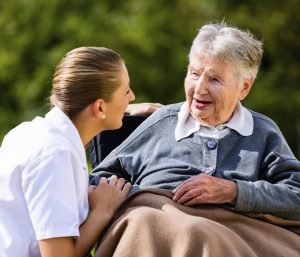From medications to finances, having plans in place can ease seniors through disasters
Chronicle Media — September 18, 2020
Have a discussion with your older friend or your relative’s caregiver about the safeguards in place if a disaster strikes,” said Paula Basta, director of IDoA. (Photo courtesy of IEMA)
As part of as part of National Preparedness Month, the Illinois Emergency Management Agency (IEMA) and Illinois Department on Aging (IDoA) are encouraging older Illinoisans and their caregivers to set aside time this month to prepare for potential emergencies.
“Illinois is home to nearly 2.7 million older adults, and some of these individuals represent a vulnerable population with functional impairments, chronic health conditions or economic limitations,” said IEMA Director Alicia Tate-Nadeau. “National Preparedness Month is an annual reminder for older adults, their families and caregivers to take a few simple steps to prepare for an emergency. Being prepared can help reduce fear, anxiety and losses associated with a disaster.”
“Seniors should not feel anxious about asking for help or preparing for a disaster. Plan for what you can, and focus on things you can control,” said Paula Basta, director of IDoA. “I encourage everyone to be mindful of our older family members, friends, or neighbors. Have a discussion with your older friend or your relative’s caregiver about the safeguards in place if a disaster strikes. If they don’t have a plan, consider assisting them in implementing some of these tips.”
Here are four tips that can help older Illinoisans prepare for a disaster or emergency:
- Create a support network: This is a great time to get to know your neighbors. Identify family, friends and others who can assist you during an emergency. Studies show 46-percent of individuals will rely on their neighbors immediately following a disaster or emergency.
Also, take a moment to identify the various services available in your area. In addition to the 211 system in many communities, IDoA can connect older adults and their caregivers with trustworthy local support resources. Learn more by using the department’s Provider Profile search tool.
- Financial preparedness: A disaster can disrupt mail service for days or weeks. If you depend on Social Security or other regular benefits, switching to electronic payments is a simple, important way to protect yourself financially before a disaster.
- Build a kit: Stores and pharmacies may be closed immediately following a disaster, so it is important to keep critical supplies, including food and medication, in an emergency supply kit.
- Medicine: Don’t wait to the last minute to have your medications refilled.
Talk to your pharmacist and health care insurer to see if your insurance plan offers a more affordable mail-order option. Some insurers are also allowing early refills and extending the term of a prescription from a 30-day supply to a 90-day supply. (See more on how Medicare is responding to COVID-19.)
Additionally, if you rely on others to help fill your weekly medication boxes or remind you to take your medications, consider the Automated Medication Dispenser Program (AMD). AMD is a service provided under IDoA’s Community Care Program.
Food: Emergency food supplies can be built over time, as to not be a cost burden to seniors. Consider picking up one extra can of food each time you visit the grocery store. Or find senior food resources online at https://eat-move-save.extension.illinois.edu/.
- Learn a new (technology) skill: Access and use of technology by older Americans is important to building and keeping socially connected. A study by Michigan State University found technology use reduces feelings of loneliness and resulted in better self-rated health, fewer chronic conditions and lower depression.
Not only can smartphones and tablets/computers help you connect with family and friends, but these devices can also offer ways to receive emergency alerts and notifications about impending weather or hazards. Illinois Care Connections can provide technology devices such as iPads or Tablets to participants thanks to a $1.7M grant through the CARES Act. You can learn more about this program’s eligibility requirements at https://www.iltech.org/repository/illinoiscareconnections.
IDoA, its 13 Area Agencies on Aging, and 46 Care Coordination Units are working to ensure that services provided by the agency are never interrupted. If you or an older family member, friend, or neighbor need assistance, visit www.illinois.gov/aging or contact the Senior HelpLine at 1-800-252-8966 (hearing impaired call 888-206-1327) or by email aging.ilsenior@illinois.gov.
IEMA offers disaster preparedness information on the Ready Illinois website (www.Ready.Illinois.gov), a one-stop resource for detailed information about what to do before, during and after disasters. During large-scale disasters, IEMA uses the Ready Illinois website, Facebook and Twitter pages to provide critical information about the incident, including shelter locations, road closures, safety information, photos and more.
For more information about emergency and disaster preparedness, visit ready.illinois.gov.







